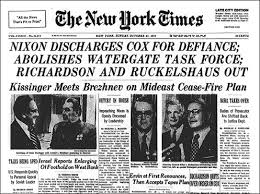James Comey’s big day: by now, the testimony of former FBI director has been much discussed, debated and dissected.
Comey’s testimony before the Senate Intelligence Committee, seen by many millions, is well-known. His Thursday morning appearance was the political TV event of 2017 – so far.
Among the lowlights: the Trump administration “lied” about Comey, and the Federal Bureau of Investigation. Trump “defamed” Comey when he claimed that the FBI had lost confidence in their former director. There was a “massive” effort by Russia to intervene in the 2016 U.S. election and elect Trump.
Comey kept detailed notes because he was concerned that “[Trump] would lie” about what was said in meetings between the two men. He testified that Trump “directed” Comey to drop the Flynn investigation. To “get rid of the investigation.”
And, this bombshell, in answer to a witless Republican politician’s foolish question about whether Donald Trump “colluded with Russia.” Comey paused, and then replied he could not answer the question “in open session.” Incredible.
To any fair-minded observer, however, the biggest news was and is this: Donald Trump plainly obstructed justice when he asked Comey to “let go” of the FBI’s criminal investigation into his close friend and advisor, Michael Flynn. He broke the law.
The U. S. Code, provision 1503, is pretty straightforward: “Whoever corruptly or by threats or force, or by any threatening letter or communication, influences, obstructs, or impedes, or endeavors to influence, obstruct, or impede, the due administration of justice, shall be [guilty of an offense].”
Trump corruptly tried to influence, obstruct or impede justice in the Flynn case. That is Comey’s sworn testimony. That is obstruction. That is an impeachable offence.
As such, Donald Trump’s corrupt, chaotic, cruel presidency will end, soon enough, in impeachment or resignation. Trump will not reach the end of his term. He will be gone, saved from prison only because his mendacious supplicant, Mike Pence, will pardon him.
Trump, in just a few short weeks, has metastasized into a cancer on the institution of the presidency. He has single-handedly shredded the reputation of the United States around the globe. It will take many years to wipe away the mud.
But there is one shining bit of light in the midst of the muck that was last Thursday’s Senate hearing. And that was the fact of the hearing itself – and that democracy, sometimes, works.
Notable congressional hearings, over the years, show that to be true. The Watergate hearings, which exposed a corrupt Republican president and forced his resignation. Former acting Attorney General Sally Yates, testifying before the Senate Judiciary Committee, about how the Russian regime had compromised the most senior members of Trump’s administration. Lt. Col. Oliver North’s 1987 Iran-Contra testimony, confirming that the Reagan White House secretly and illegally supplied arms to Iran. The Supreme Court confirmation hearings of sexual predator Clarence Thomas, featuring the testimony of one of his victims, lawyer Anita Hill.
All of those hearings, however they concluded, shone light into some dark corners. They exposed the misdeeds of the powerful. They improved democracy in the United States. They generally showed, in James Comey’s own words, that “we are a functioning, adult democracy.”
Canada has had not a few such hearings, as well. Democracy has mostly benefitted from them, too.
Pierre Trudeau’s extraordinary appearance before a House-Senate committee hearing on the Meech Lake Accord, which ultimately sank the ill-conceived accord. The assorted inquiries into the repatriation of our Constitution, and the creation of our Charter of Rights and Freedoms. And, of course, the day-to-day work of less-newsworthy House and Senate committees – all of which improve Canadian democracy.
These committee do not always work, of course. Speaking personally, I can testify to the fact that the various sponsorship program inquiries – whose terms of reference had been rigged by Paul Martin’s administration to prevent scrutiny of their spending on polling – were an unmitigated farce. The Martin regime actively stonewalled attempts by this writer (and others) to offer testimony about Martin regime spending with certain polling firms.
But that is an exception. For the most part, most of the time, these myriad committee hearings – whether they be here, in the U.S., at the level of an obscure Commons committee, or an extraordinary Senate Intelligence Committee prying back the lid on Donald Trump’s corrupt administration – are good for democracy.
They may look democracy look bad, in the short term. Sure. But, in the long term, they improve it, too.
That, more than anything else, is one indisputable truth that emerges from James Comey’s big day.
Comments (4)


